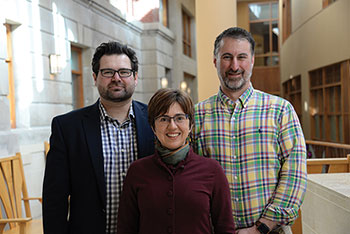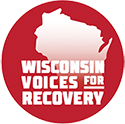Outreach, education, advocacy and research supports recovery
The Midwest has been particularly challenged by the national opioid crisis. Between 2016 and 2017, opioid overdoses in the region jumped 70 percent, compared to a national average increase of 30 percent. In Wisconsin, emergency department visits for opioid overdose increased at least 50 percent—among the highest in the nation.

Drs. Andrew Quanbeck, Aleksandra Zgierska and Randall Brown (pictured above, from left) lead numerous initiatives to tackle the many forms of addiction.
As part of the solution, University of Wisconsin Department of Family Medicine and Community Health (DFMCH) faculty lead initiatives to reduce the impact of not just opioid use disorders, but all addictions.
Consult Hotline, Virtual Continuing Education
In what is believed to be a national first, the DFMCH’s Randall Brown, MD, PhD, FASAM, leads the University of Wisconsin Addiction Consultation Provider Hotline, which provides daily on-call support to help Wisconsin primary-care providers manage patients with addictions. The hotline team focuses on acute, clinic-based care of the full range of addictions, but also advises on longer- term care and follow-up.
Dr. Brown also leads a Project ECHO® series called ACCEPT (Addiction & Co-morbid Conditions: Enhancing Prevention & Therapeutics). These free monthly videoconferences connect addiction-medicine experts with providers statewide. Through a collaborative case discussion and a didactic presentation from a member of a multidisciplinary specialist panel, participants learn strategies for managing all substance use disorders, including opioid use disorders.
Funding for both programs comes from Wisconsin Department of Health Services (DHS) grants.
Statewide Recovery Network
The DFMCH is also home to Wisconsin Voices for Recovery, a statewide network that aims to create sustainable peer-to-peer recovery support resources across Wisconsin.
With funding from the Wisconsin DHS (principal investigator: Alison Miller, DO) and support from the DFMCH, the program offers education, connections to community resources and an advocacy platform focused on reducing stigma and promoting recovery.
It also awards seed funds through its ED2Recovery program to organizations, including recovery community organizations, for peer-to-peer services provided by recovery coaches and certified peer-support specialists to individuals with an opioid use disorder who are referred from emergency departments or other settings.
Membership in Wisconsin Voices for Recovery is free and open to anyone interested in improving recovery support services in Wisconsin.
Addiction Medicine Fellowship
The DFMCH has been instrumental in training physicians to become board certified in addiction medicine.
In 2010, Dr. Brown established and began directing the DFMCH’s multidisciplinary addiction medicine fellowship. It was one of the first in the nation and was recognized as a National Model Program by the American Board of Addiction Medicine.
Fellows learn to prevent, assess and manage patients with substance use disorders and related illnesses, focusing on medication-assisted treatment and integrating addiction treatment into primary care.
The fellowship received formal accreditation from the Accreditation Council for Graduate Medical Education in 2018, soon after national application requirements were released.
Research Innovation
DFMCH researchers also focus on innovative therapeutic approaches and system-level improvements to help prevent and treat addiction.
Dr. Zgierska is leading a five-year multisite clinical trial (STAMPstudy.org), supported by the Patient-Centered Outcomes Research Institute, to compare the effectiveness of mindfulness meditation with cognitive behavioral therapy in patients with opioid-treated chronic low back pain.
And in one National Institutes of Health (NIH)-funded project, the DFMCH’s Andrew Quanbeck, PhD, along with Drs. Brown and Zgierska, works to better integrate opioid prescribing guidelines into 38 Wisconsin primary-care clinics.
The project builds on a pilot study that found that distilling clinical guidelines into an implementation guide, and providing six months of coaching to clinical teams at four family medicine clinics, resulted in an 11 percent reduction in opioid doses in those clinics. Other guideline elements implemented included mental health screening, treatment agreements, and regular urine drug testing.
More recently, Dr. Quanbeck began a second NIH-funded project to investigate whether a smartphone app that monitors the activity of people with alcohol use disorders and delivers interventions as needed could be integrated into primary care.
Together, these initiatives are critical steps for addressing the impact of addiction on individuals, families and communities in Wisconsin—and beyond.
Published: May 2019
How to Participate
![]() University of Wisconsin Addiction Consultation Provider Hotline
University of Wisconsin Addiction Consultation Provider Hotline
- Open to Wisconsin providers only
- Available weekdays, 8 a.m. to 5 p.m.
- For assistance, call the UW Health Access Center at 608-263-3260 (800-472-0111 outside Madison)
Project ECHO® Series: ACCEPT (Addiction & Co-morbid Conditions: Enhancing Prevention & Therapeutics)
|
 |
 Wisconsin Voices for Recovery
Wisconsin Voices for Recovery
- Public advocacy and education
- Provides seed funds to organizations to employ recovery coaches and certified peer-support specialists
- Membership is free and open to anyone interested in improving recovery support in Wisconsin
- Details at: https://wisconsinvoicesforrecovery.org
